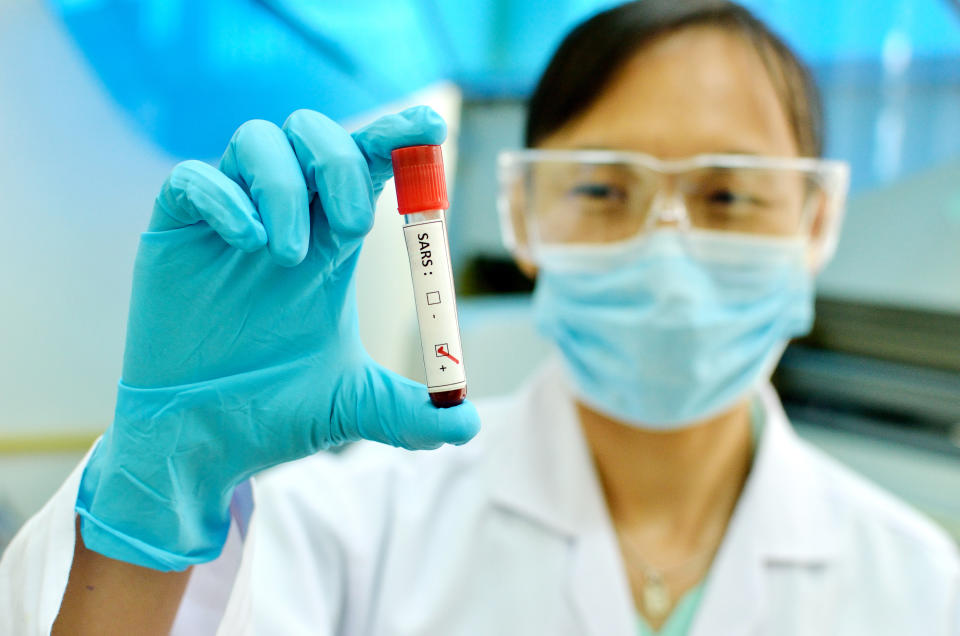What are the coronavirus symptoms and when should I see a doctor?
Looking for more of the best deals, latest celebrity news and hottest trends? Sign up for Yahoo Lifestyle Canada’s newsletter!
With the novel coronavirus continuing to spread around the globe, health experts are emphasizing the importance of seeking medical advice if you notice any symptoms—by calling 811 or your local health professional first before going to a clinic or hospital.
But what exactly are the signs of COVID-19, the illness that the coronavirus causes?
The answer is not straightforward, making global efforts to contain the virus that much more difficult. With so much misinformation, it’s no wonder people might be confused.
What we do know
The novel coronavirus is genetically different than other coronaviruses, but the symptoms it produces can resemble those of the common cold or flu.
“The main hallmarks are dry cough, fever, body aches, and malaise…but for some people, especially young, healthy people, it can be very mild,” said B.C. Public Health Officer Dr. Bonnie Henry at a recent media briefing. “It’s very hard, particularly early on, to tell the difference between influenza, coronavirus, and other cold symptoms circulating this time of year. Really, that’s why testing has been so important, helping us understand who has this disease and who doesn’t.”
When asked if there was a single symptom that would be a telltale sign of COVID-19, Henry said no. Based on data from China gathered from the first cohort of patients with the illness, “the vast majority have fever and dry cough—but not everybody,” Henry said.

“It can start like so many other things,” Henry said. “For most people, the first week can be relatively mild symptoms, although some people get very sick very quickly, particularly older people or people with underlying health conditions.”
The second week is where things can change for people.
“They can become more short of breath, they can have more cough—that’s the virus causing inflammation in the lungs, or pneumonia,” Henry said. “We know that pneumonia is a hallmark of this, but you can only tell pneumonia by a chest X-ray or CT scan.”
If people are experiencing shortness of breath, they should access healthcare without delay.
Symptoms may take up to 14 days to appear after exposure to COVID-19.
Just as with influenza, the illness can last for several weeks.
ALSO SEE: Do face masks actually help prevent coronavirus?
“We know that people who have mild to moderate disease tend to get better after two to three weeks, while more severe disease becomes apparent by the second week and it can be three to six weeks before they get better, and they need extended care in hospital during that time,” Henry said.
People with mild symptoms can generally isolate at home, Henry said. If their symptoms progress to include fever or cough, that’s when they should contact a healthcare provider, ideally by phone first.
“Not everybody who has fever and a cough has coronavirus but they may need to be tested for influenza,” Henry said. “We take it on a one-by-one basis.”
The novel coronavirus is just one type of coronavirus, which usually circulate among animals. For the most part, they don’t make animals sick. Every now and then, however, it leaps the species barrier into humans.

Such was the case with severe acute respiratory syndrome (SARS), from civet cats, in 2003 and Middle East Respiratory Syndrome (MERS) in 2012 from dromedary camels. The source of the novel coronavirus is still being determined.
“The difference with this virus is that it’s less severe than SARS…but much more severe than what we see with influenza,” Henry said. “It’s more transmissible, it spreads from person to person much more easily than with SARS but not as easily as influenza. It’s a challenging virus to contain.”
You should stay away from others even if you just have the sniffles to help prevent possible transmission, Henry suggested.
“This is a global crisis,” she said. “We have to be careful we’re not spreading any respiratory illnesses to others by not going into hospitals or longterm care home.”
ALSO SEE: How can coronavirus kill young, healthy people?
“We are dealing with this as a global community,” she said. “All of us need to take extra precautions more than we would normally think of at this time of year. Isolate, give your body time to heal, give yourself some time if symptoms develop to cough and shortness of breath. If you know you’ve been in contact with somebody or been travelling to a place where virus has been, call 811, call a healthcare provider and make make sure you’re assessed, if needed tested, and cared for safely.”
The most effective way to prevent the spread of the virus and to stay healthy is frequent, proper hand-washing. Do not touch your face with your hands, sneeze into your sleeve (not your hand), and maintain at least one metre distance between yourself and anyone who is coughing or sneezing.
Let us know what you think by commenting below and tweeting @YahooStyleCA! Follow us on Twitter and Instagram and sign up for our newsletter, coming soon.



